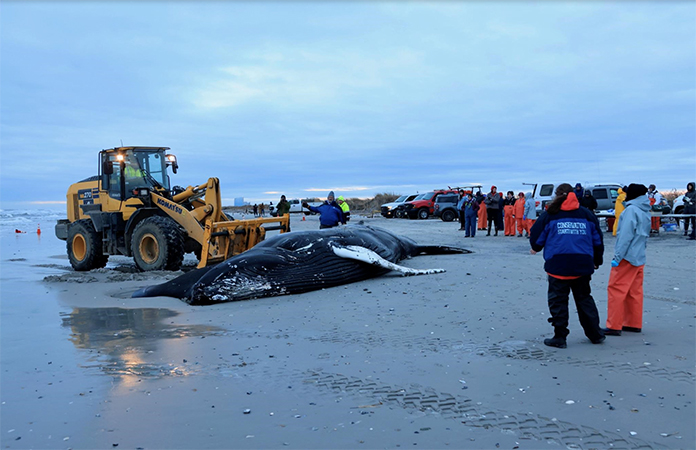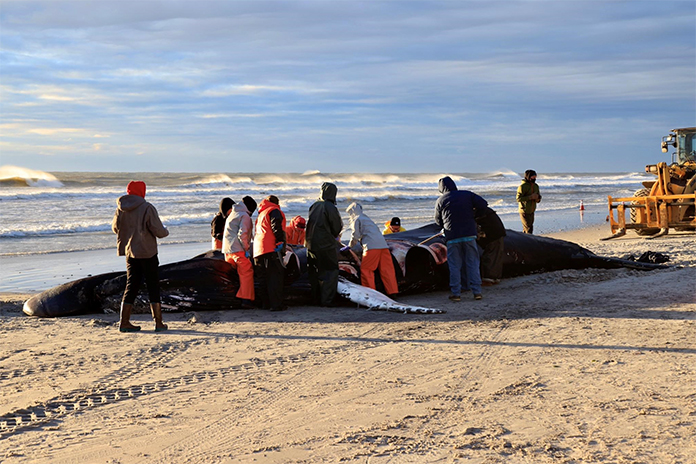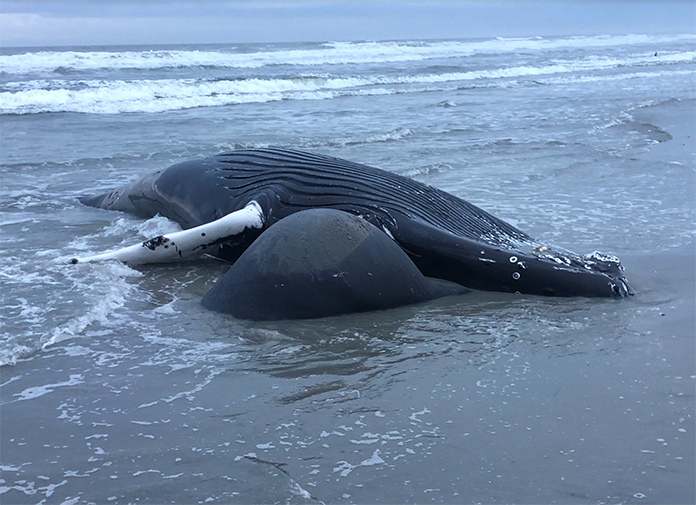
JERSEY SHORE – There have now been a total of eight dead whales that have washed up on the New York-New Jersey coastline within about a one-month time span.
The latest whale was found washed up at a beach in Brigantine, while other dead whales were discovered on the Atlantic City coast.
The Marine Mammal Stranding Center (MMSC), a non-profit dedicated to rescue and rehabilitation of stranded marine mammals and sea turtles, responded to the whale strandings and provided updates to their Facebook page.
“More than 36 people, including about 25 stranding network members from MMSC, AMCS, Mystic Aquarium, and MERR Institute, were on hand to conduct a necropsy on the humpback whale that washed up on the North End Natural Area in Brigantine on January 12,” MMSC wrote. “The necropsy team was able to obtain the necessary samples of tissues and organs for further laboratory testing.”
The MMSC further stated that when testing these whales, results can take several months to come back before a cause of death can be determined.

Local climate groups have expressed major concerns, demanding officials to put a stop to an offshore wind project in order to properly investigate the strandings. Groups believe that pre-construction of offshore wind turbines could cause harm to marine life. Survey work emits noise and sonar and the animals can also collide with vessels.
Groups are also calling on U.S. President Biden to take immediate steps to address this environmentally harmful trend.
“The wave of dead whales is the ocean sounding the alarm,” said Cindy Zipf, executive director of Clean Ocean Action, “and we must heed the warning.”
“These tragic multiple deaths of mostly young, endangered whales are of no apparent cause, however, the only new activity in the ocean is the unprecedented concurrent industrial activity by over 11 companies in the region’s ocean, which allows the harassment and harm of tens of thousands of marine mammals. Moreover, federal and state agencies have been recklessly fast-tracking offshore wind development projects. These three coinciding factors raise suspicions, and a responsible and reasonable response is the action plan for which we are calling,” Zipf added.
Although no offshore wind turbines have been built in the state, Governor Phil Murphy is pushing several projects in order to reach his offshore electric wind generation goal of 11,000 megawatts of usage by 2040.
“Since offshore wind projects were being proposed by Governor Murphy to be built off the coast of New Jersey, I have been adamantly opposed to any activity moving forward until research disclosed the impacts these projects would have on our environment and the impacts on the fishing industry,” said Congressman Van Drew (R-2nd). “Ocean life is being put at risk as our governor and president force through their Green New Deal policies, without giving full consideration to their real-world impacts. We have seen a complete lack of transparency from New Jersey’s leaders, as well as D.C. politicians who are ramming through these projects in order to push their climate agenda.”
The National Oceanic Atmospheric Administration said it has been studying what it calls “unusual mortality events” involving 174 humpback whales along the entire east coast since January 2016. Agency spokesperson Lauren Gaches said, “that period pre-dates offshore wind preparation activities in the region.”
On January 17, local environmental advocates gathered to dissipate false narratives about offshore wind farms. They also discussed other factors such as climate change, ocean warming, vessel strikes, trawling, and other manmade threats that can pose as a danger to whales. Additionally, they expressed their continued support for responsible offshore wind development in full compliance with the Marine Mammal Protection Act.

“Blaming offshore wind projects on whale mortality without evidence is not only irresponsible but overshadows the very real threats of climate change, plastic pollution, and unsustainable fishery management practices to these animals. There have been many mitigation techniques identified for reducing the threat of offshore wind development to whales and other wildlife. We should focus on implementing these while continuing to push for clean energy. These include specific turbine configurations and entanglement deterrents,” said Anjuli Ramos- Busot, New Jersey Director of the Sierra Club.
“You know what the greatest threat to whales is? Climate change! New Jersey has been blessed to have more whales thriving off our shores the past few years but that means we’re also cursed with more dead whales washing up on our shores. Given the climate emergency and other threats to endangered species, we can’t speculate, we must apply sound science and the precautionary principle all the time,” said Amy Goldsmith, NJ State Director of Clean Water Action. “We must advance offshore wind responsibly and quickly, and that’s what New Jersey is doing. We must investigate and apply lessons learned from these strandings too. Promoting offshore wind and saving the whales are part of a multi-tiered effort to get off dirty fossil fuels, create good jobs, and protect our precious natural resources from beautiful ocean views to the awesome wildlife beneath them.”






